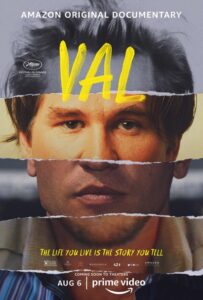 By Steve Crum
By Steve Crum
What a privileged, adventuresome, sad, creative, and now challenging life Val Kilmer has lived. His autobiographical documentary, Val, is a fascinating look about the actor whose life and times took a tragic turn in 2014.
“My name is Val Kilmer,” he says in the film’s opening. “I was recently diagnosed with throat cancer.” That was then—8 years ago. Now he speaks through a computerized voice placed in his throat.
Most of the 108 minute documentary is narrated, using his dad’s words, in well modulated voice by Val’s son, Jack—who sounds so much like his father that it both puzzled and fooled me.
But when Val does speak, as he frequently does in this story, it is via robotic-sounding, neck box sound. Of course, that does not reference Val’s distinctive speaking voice in old film clips of him from his childhood through motion picture roles.
It so happens that the numerous video footage is supplied by Val himself—whose family took many reels of 8mm footage to document their early family history. That mindset has continued to this day as he and his adult kids (son Jack, daughter Mercedes) now digitally film dad Val at work and play.
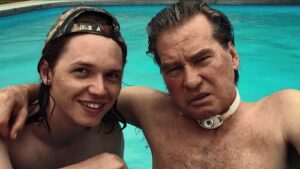 “I have thousands of hours of tape, being the first to own a video tape recorder (in the world),” the now 62 year-old Val says. “I’ve wanted to tell a story about acting for a long time. Now that it’s more difficult to speak, I want to tell my story even more.”
“I have thousands of hours of tape, being the first to own a video tape recorder (in the world),” the now 62 year-old Val says. “I’ve wanted to tell a story about acting for a long time. Now that it’s more difficult to speak, I want to tell my story even more.”
Indeed he does just that, quite thoroughly. Val is the journey of an actor from childhood to formal training at Juilliard to success in Hollywood.
So it goes. Home movies showcase Val and his brothers Wesley and Mark in hammy mini-movie productions shot in their house and backyard. Living a somewhat privileged life thanks to his real estate investment father, Eugene, the Kilmer house was located “down the street from Roy Rogers’ ranch.” The Rogers property was eventually owned by Dad Kilmer.
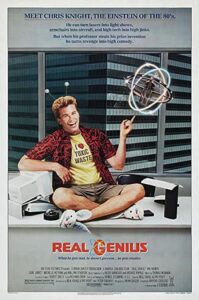 Cut to amateur footage of Val in plays from elementary through high school. After being the youngest kid ever accepted into Juilliard Drama School in New York, Val’s brother Wesley dies at 15. Then, for a while, no more plays. The Kilmer Family “was never the same again.”
Cut to amateur footage of Val in plays from elementary through high school. After being the youngest kid ever accepted into Juilliard Drama School in New York, Val’s brother Wesley dies at 15. Then, for a while, no more plays. The Kilmer Family “was never the same again.”
Val then focused on playwriting, and moved into a NYC apartment. He focused on Shakespeare and the like…easing back into acting. Insert even more home movie footage on video, including Val and friends acting silly around the apartment, stage rehearsals, and showing off.
The Second Act of Val surveys his movie years, from his first hit film, Top Secret (“To this day I have trouble explaining what it is about”) to portraying “Ice Man” in Top Gun to the wildness of Real Genius. Swatting flies by his pool, Val explains the problem of eating and talking with his “throat hole” and breathing tube. He also speaks of his mother’s new husband, divorce, and his disdain for hometown Chatsworth, California.
Val’s candor is revealing about the relationship with his late father, increasingly financial, and his marriage to Willow co-star Joanne Whalley.
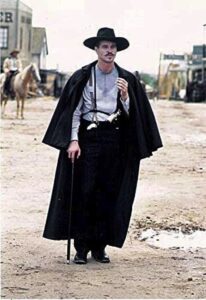 He reveals the movie role he fought to have, but never got. Then there are the parts that made him memorable: The Doors and Tombstone. Remarkably, Val Kilmer was not Oscar nominated for the latter (“I’ll be your Huckleberry”), giving a stunning performance as Doc Holliday.
He reveals the movie role he fought to have, but never got. Then there are the parts that made him memorable: The Doors and Tombstone. Remarkably, Val Kilmer was not Oscar nominated for the latter (“I’ll be your Huckleberry”), giving a stunning performance as Doc Holliday.
Kilmer calls his wearing the clunky Batman costume in Batman Forever “a struggle,” and his Caped Crusader acting “soap opera.” He lauds working with Pacino and De Niro in HEAT as “great.” Then there is his work in The Saint, which he did for a surprising reason.
Sandwiched between the movie excerpts, Kilmer glazes over his thoughts of death…and life. These days life can be tough for him.
The Final Act of this true story focuses on what Val’s life is like now. He laments his depression of flying around the world to meet fans and sign autographs, picking up some cash in the process at comic and celeb conventions. One sequence shows fans lined up to meet, greet and get Kilmer’s signature, but that has to be put 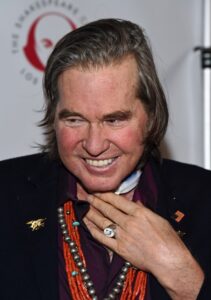 on hold as Val takes a break to head backstage to clear his breathing/speaking tube.
on hold as Val takes a break to head backstage to clear his breathing/speaking tube.
It’s a necessary part of the life he now has.
That life includes a tearful Val missing his late mother; and the disappointment of not being able to finish his tour portraying Mark Twain because of his voice problem. While hospitalized, Val began painting as part of his healing. As well, he has become fascinated with church and religions.
Co-produced and written by Val, the direction is by Leo Scott and Ting Poo. But it is the genius of Scott who edited the many hours of footage to make Val so impactful.
∞∞∞∞∞
GRADE on an A-F Scale: A
